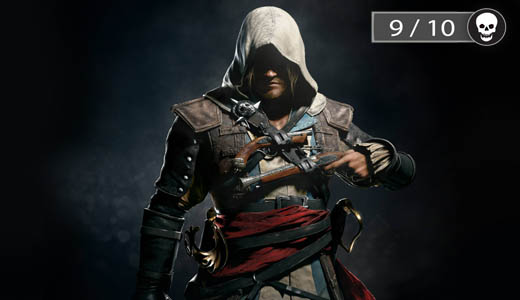Call me Captain Cynical! After Assassin’s Creed 3, I was about done with the series, and just generally assumed the series latest entry would be another (pirate) write-off. Oh, how wrong I was.
Assassin’s Creed 4: Black Flag, breathes new light into this tired franchise and is, in my humble opinion, the strongest AC outing yet.
AC4 opens with a bang, literally. Privateer (read: pirate) Edward Kenway (grandfather of AC3’s Connor Kenway) and his crew, run afoul of a ship carrying an Assassin, trying to make a defection to the dreaded Templars, the series’ bad guys. An epic sea battle ensues, both ships are destroyed, and Connor and the Assassin wind up stranded on a tropical island. Through no more than a combination of luck, greed and general annoyance, Connor and the Assassin clash further, and Connor makes short work of the traitorous knave, killing him and taking his robes. In a stroke of sinister genius, Connor decides to pose as the man he’s just killed in order to fulfill the contract he was working on – in the hopes of making some quick coin. So begins his unexpected dive into the exciting world of Assassin’s Creed, in a very atypical way.
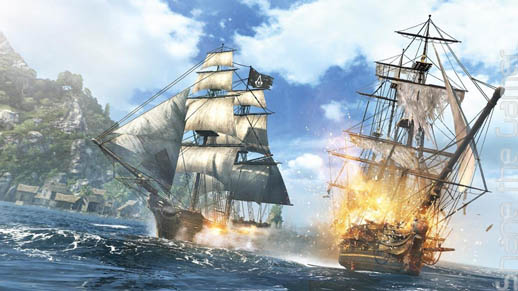
Altair, Etzio, and Connor – the previous protagonists in the AC series – all have a few things in common – strong, silent types, honour bound to not only the creed of the Assassins, but their own personal moral code, always driven by something internal to help make the world a better place. They do the right thing. Connor has no such problems – he’s loud, brash, kind of a dick, and driven solely by his desire to earn himself a bit of money, and return to his estranged wife in London with a bit more standing and the resources to take care of her. Of course, life has other plans, and Edward gets swept up in things far beyond his control. Over the course the games narrative, we see Edward grow and respond to the world around him and the changes he faces in the most natural, compelling and fulfilling ways this series has ever seen, and you find yourself truly invested in the well-being of the lovable rouge.
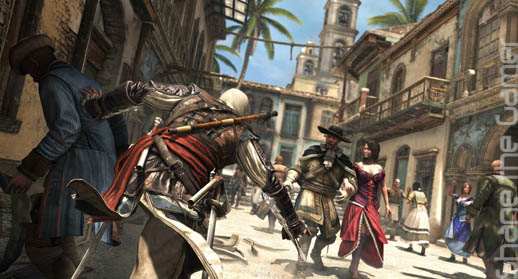
Like any good AC game, you’ll meet a great raft of fictionalized versions of actual people along the way – there’s a certain thrill that comes from directly dealing with Blackbeard or Calico Jack. All of these characters, along with the many fictional ones, are woven perfectly into a complete, evenly paced narrative, strung together with some terrific voice performers and amazing scripts that manage to sound appropriately pirate without ever straying into hammy, cheesy ‘Argh, me hearties’ territory. Furthermore, all of this takes place against the most beautiful, vibrant and colourful landscapes the series has ever seen. Gone are the grey and sandy tones of Israel, the white stones of Italy and the bland dark cities of Boston – the Caribbean is a bright and wonderful place. Between the houses being various shades of orange, yellow and blue, the lush green jungles, and the sea alive with various shades of blue, AC4 is really a treat to look at. I can’t wait to see how it looks on the next gen consoles.
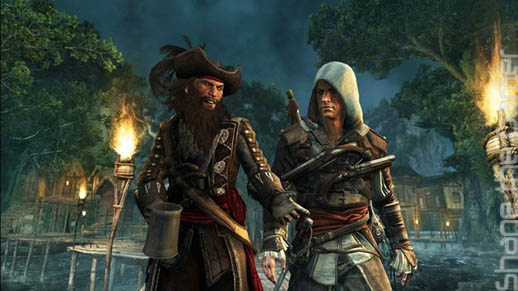
But, if you’re a fan of the series, you’ll know that historical events of the game are only half the plot – the rest of it is what goes on outside the simulation. And if you finished the last game (I’ll try and avoid spoilers here), you’re probably wondering how the Kenway line is accessed. After the complete shambles of sci-fi plot of AC3, AC4 delivers something truly brilliant and incredibly clever, through the meta inclusion of the new ‘Abstergo Entertainment’. When you boot up the game, you may notice the Abstergo logo and query why the corporation that fronts the Templar organization in the modern age is bringing you your game. The series is quick to explain that animus technology is being used to capture memories from people and recreate them as video games – with their first success being Assassin’s Creed: Liberation, a game that was released on PSP several years ago. This incredibly meta plot works amazingly as a device throughout the game and is the first time in a while the series has made me go ‘What the heck is going on?’ in a way that makes sense.
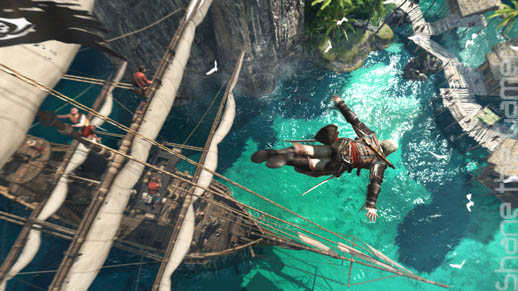
But when you strip away the plot, and how good the game looks, you’re left with just the gameplay – the most important factor of all in the AC series. Luckily, AC4 plays excellently and Edward gets around with just as much speed and agility as any of his predecessors. Combat is even tighter this time around, with more emphasis placed on timing and enemy combat variation, with assassination techniques remaining much the same.
The real stand-out, however, is the on-sea segments. After AC3, I feel safe in saying that nobody was really begging for more ship based segments, so I dreaded AC4 putting a huge emphasis on sailing. And they did, but luckily, I was wrong – every time you step on Edward’s ship – The Jackdaw – you’re in for some of the best gameplay the game has to offer. Taking to the seas to attack, board and plunder other ships is some of the best fun the series has ever offered, and the controls that make this happen are remarkably tight. You’ll quickly find yourself aimlessly searching the high seas in search of your next challenge, because the sea combat is just that good, and you’re always after the next plundered resource to make your ship even more powerful.
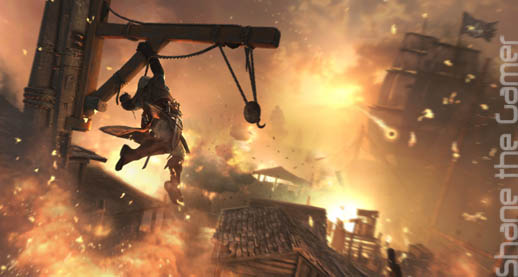
With a good 15 hours of main story gameplay and countless hours of side missions, treasure hunting, sea combat (including the devastatingly challenging legendary ships), hunting and all other manner of fun, AC4 really is the whole package, and the first AC game I’ve wanted to keep playing after I’d crossed the central plot’s finish line. Easily the strongest of the series, AC4 is definitely one you want to get your hands on. Yo ho, yo ho, a pirate’s life for me.
[jwplayer player=”1″ mediaid=”5753″]


